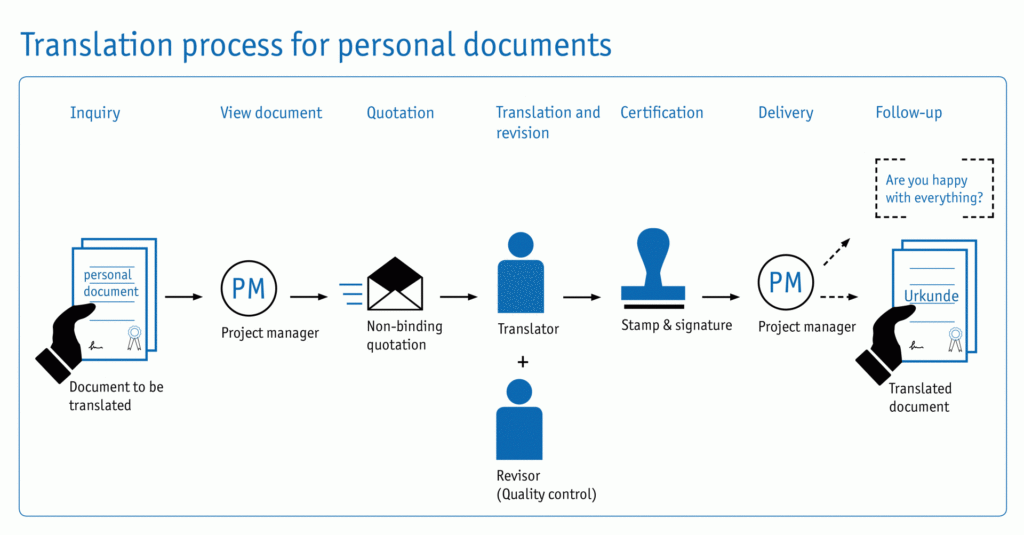Translating personal documents

What you need to know to have your personal documents translated
Translating certificates and other personal documents (which usually need to be certified) is a particularly challenging part of our job. These translations may appear straightforward at first glance, but there are all kinds of considerations that make them extremely time-consuming.
School and university diplomas, for example, require painstaking research – beyond the individual words, we are essentially translating a whole education system. Laborious formatting is then needed to reproduce the layout of the original as closely as possible. When translating a professional reference, it’s crucial to strike exactly the right tone.
So a surprising amount of work goes into the translation of your birth certificate or degree – and in translation, as elsewhere, quality comes at a price. This is something to keep in mind when arranging your translation. You are much less likely to be taken aback by the price label when you consider everything that’s involved in creating the final product!
The road to a certified translation can seem as complex for the customer as for the translator, so we’ve put together a quick guide to help smooth the way and spare you from any unpleasant surprises:
- How much will it cost? We can only provide a quote once we’ve seen the documents you want to have translated. We can’t estimate the price based on a description over the phone, even if “it’s just one page!” – in our experience, one page is rarely the same as another.
- You don’t need an appointment. You can drop by during our office hours (9 am – 6 pm) to bring us your documents in person, or simply email us a scanned copy. It won’t take us long to draw up a non-binding quote for you.
- A minimum fee applies to all documents, including those with only a small amount of text, to account for the administrative work that every translation involves.
- A flat fee is often set for certificates and other personal documents (rather than the usual price per line of text). This fee takes into account both the translation work itself and the amount of formatting that we estimate will be necessary.
- How long will it take? The timescale for a translation depends on our translators’ existing workload as well as the time required for the job itself. We always recommend that you arrange your translation in plenty of time in order to avoid express surcharges.
- However, you can use our express service if time is of the essence – for example, if you’re about to travel abroad and suddenly realise that you’re missing an important document. We can usually accommodate urgent translations at the last minute, although this will entail an additional fee.
- What information do I need to provide? It’s essential that you find out in advance exactly what is required by the authority which has requested the translation. We are well versed in translating and certifying documents, but we can’t specifically advise you which authorities require which documents to be submitted with which type of certification.
- If the translation needs to be certified from the original, we will of course need to see the original, either when you come to arrange the translation or when you pick it up. If it only needs to be certified from a copy, then a scan or a photocopy is perfectly sufficient.
- In some cases, a translation must be notarised. This means that a sworn translator must sign it in the presence of a notary public, who then certifies the translator’s signature. We can only meet with the notary by appointment, so please allow time for this when arranging your translation.
- Occasionally, a translation must also be apostilled by the district court after being notarised. We can take the translation to the court on your behalf, or you can do this yourself to save costs.
- Handwritten entries on documents can often be difficult for the translator to make out. To ensure an accurate translation, it would be helpful if you could type up any especially unclear entries in a Word file beforehand.
- In particular for multi-page documents such as court judgements, it might be that only an excerpt is really relevant. We recommend that you find out exactly what is needed and highlight the important passages if it’s not necessary to translate the whole document. This can save you time and money.
- Why choose Peschel Communications? We put great emphasis on quality. All of our translations are carried out by a native speaker of the target language and then revised by a second translator.
- Customer satisfaction is equally important to us. If you have any questions or comments, we will be more than happy to discuss them. Please don’t hesitate to get in touch, either by e-mail at contact@peschel-communications.de, or by phone on +49 761 3809690.